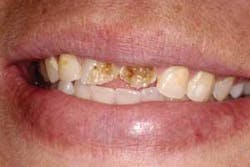Cosmetic Dentistry: More than a smile
by Mark Sayeg, DDS, FAGD
For more on this topic, go to www.dentaleconomics.com and search using the following key words: Give Back A Smile, AACD, Dr. Mark Sayeg, transform, self-confidence.
The smiles we create change people. Yes, we make our patients' smiles more esthetically pleasing. That is a benefit in its own right. But when our patients walk out of the office and back into their lives, the real change happens. In many cases, their lives are transformed. Many experience a self-confidence that they have not previously experienced. New and enhanced self-esteem can make an enormous difference in a person's life. Studies show that new and restored smiles make people feel younger and more confident. Moreover, they demonstrate an increased ability to communicate, have greater sex appeal, and possess an improved talent for developing positive personal and professional relationships.
My entry into cosmetic dentistry began when I joined the American Academy of Cosmetic Dentistry. Like other members of the AACD, I enjoy seeing the immediate changes when patients see their new smiles for the first time. Over time, many cosmetic dentists see patients return to the practice with other incredible changes: new hair, clothes, jobs, and — more importantly — relationships.
One of the most dramatic examples of this phenomenon is what AACD members experience when restoring the smiles of domestic abuse survivors. The AACD Charitable Foundation's Give Back A Smile program matches AACD member dentists with survivors. In many cases, they have had their self-esteem broken down for years by an abusing spouse or partner before they make a decision to break out and start their journey to a better life. The GBAS program gets involved when survivors show they want to take responsibility for their future. While it is only one step on the road to recovery, it is important.
Through the years, AACD members have restored more than 650 smiles — and lives.
"Susan," a GBAS recipient, can't stop smiling. She not only has a perfect set of teeth, but after enduring repeated physical abuse, she has renewed self-esteem.
"I had a broken spirit," she said. "I became very isolated … and became a recluse."
When the work was finished, a dental assistant handed Susan a mirror.
"I was overjoyed," she said. "I feel beautiful. It's given me my self-esteem and self-worth. It's given me back my life."
In 1969, Nathaniel Branden, PhD, defined self-esteem as "the experience of being competent to cope with the basic challenges of life and being worthy of happiness."
American psychologist Abraham Maslow describes two kinds of esteem needs — the need for respect from others and the need for self-respect. Without the fulfillment of these needs, an individual can feel discouraged, weak, and inferior. While a pleasant smile alone will not fulfill this criteria, it does help in how other people perceive us and how we feel about ourselves.
As dentists, we know about a smile's positive benefits on facial muscles. But science aside, when we smile, we attract smiles from others and our spirits are lifted. When we feel good about ourselves, we are more positive about people around us. We feel more equal with others instead of feeling inadequate and thinking we don't quite measure up. Ultimately, when we take more control of our lives, we have more confidence, make better decisions, believe our actions count, and feel valued for who we are and what we do.
The story of "Charlotte," another GBAS recipient, illustrates this.
"I would like to share how my life has changed after being in this wonderful program," she said. "I am able to smile with confidence and my self-esteem has been built up. I can finally smile without covering up my mouth. In the past, I was so embarrassed to talk or smile, but now I am able to stand before a group of people — especially at my church — and feel confident in my speaking. I will forever be thankful to Suwanee Dental Care, Dr. William B. Williams, and the Give Back A Smile program for changing my life forever."
Social psychologists tell us that most people spend about 30 seconds making their first impressions of people. For better or worse, appearances count in today's world. According to Susan Bixler in her book, "The New Professional Image," personal appearance includes clothes, posture, hands, and a pleasant face. At the center of the face is the smile, the facial feature most employment interviewers focus on as they ask questions.
Thus, the smile is integral in this process. A 2004 AACD study found that virtually all Americans believe a smile is an important social asset, and that 96% of adults believe an attractive smile makes a person more appealing to members of the opposite sex. Also, 74% of adults feel an unattractive smile can hurt a person's chance for career success.
The spring 2008 issue of the AACD Journal of Cosmetic Dentistry featured a woman referred to as "Erica" in its cover article. Erica shared how she was ashamed of her dental condition and was afraid to smile.
"For years I was extremely hesitant to leave the house alone because I was worried that someone would engage me in conversation, and I envisioned their disgust if I were to accidentally smile or show my teeth," she said. "I discontinued my college education because I was fearful of showing my teeth during class discussions. In fact, I withdrew from any activity that might cause me to show my teeth."
That was before Dr. H.R. Makarita, of Oakton, Va., restored the smile that had disappeared from Erica's encountner with bulimia — a condition that affects more than seven million people in the United States. Erica suffered from low self-esteem. After her smile was restored, she showed a much improved self-confidence.
"A smile is much like life itself in that you never fully appreciate it until you are faced with losing it," Erica said. "I am forever grateful to modern dentistry and Dr. Makarita for restoring my confidence, and with that, the course of my life. I soon will be returning to school to obtain a degree in dental hygiene so that I can play a small part in passing on this gift to someone else."
Cosmetic dentists can help people feel better about themselves, improve their self-esteem, and thrive. This is the mission and essence of the GBAS program.
"Sara," a GBAS recipient, said, "You don't usually realize what a difference it can make in your life to lose your smile unless someone or something destroys it. Then you realize how differently people look at you, and you become self-conscious. This eats at you, destroying confidence, pride, and self-image."
Restoring survivors' smiles is often the clincher that boosts their self-esteem and self-confidence so they may again face the world as a whole and different person.
In my practice, we had the pleasure to restore the smile of "Julia," a woman who had been physically abused. After we restored Julia's smile, she sought and obtained the job training she needed.
This permitted her, for the first time, to support herself and her children. Julia's mother said that after her smile was restored, she smiled at her baby for the first time, without fear of scaring the baby.
So, the next time you whiten someone's teeth, contour a smile, or place veneers, remember that you might be helping that person beyond just providing dental care. You could be providing the self-esteem and confidence to change someone's life.
Editor's Note: Names of survivors have been changed for their safety and to protect confidentiality. References available upon request.
Mark Sayeg, DDS, FAGD, is a 1982 graduate of Emory University Dental School. He is a past chair of the AACD Charitable Foundation and its Give Back A Smile Program. Dr. Sayeg has a private practice in Atlanta, Ga. Contact him at [email protected].
We invite you to explore the opportunities AACD membership can bring you, as well as the advantage you can give to others through Give Back A Smile. It is rewarding and important for the many lives that are touched. For more information on the AACD or the charitable foundation, go to www.AACD.com.



